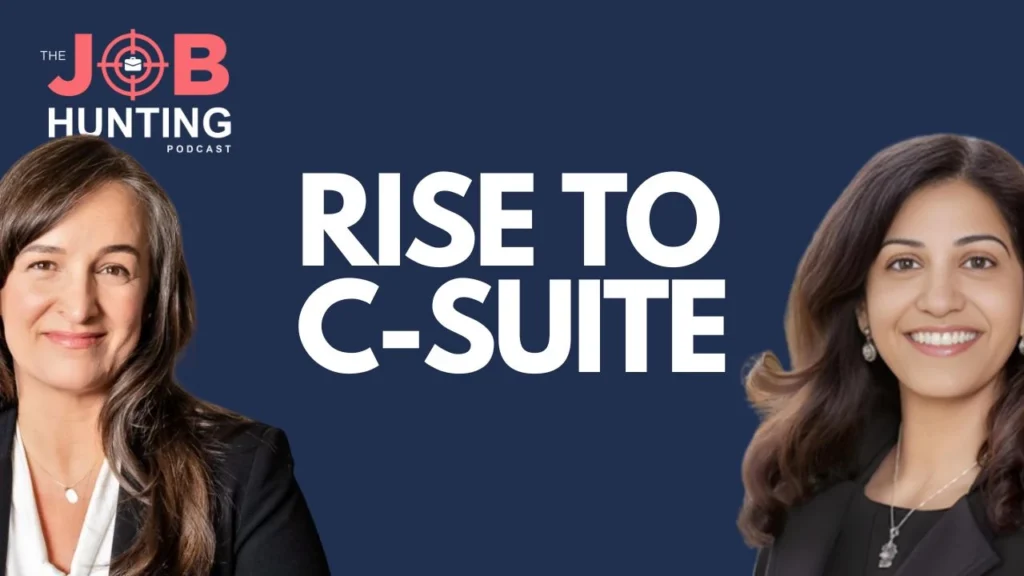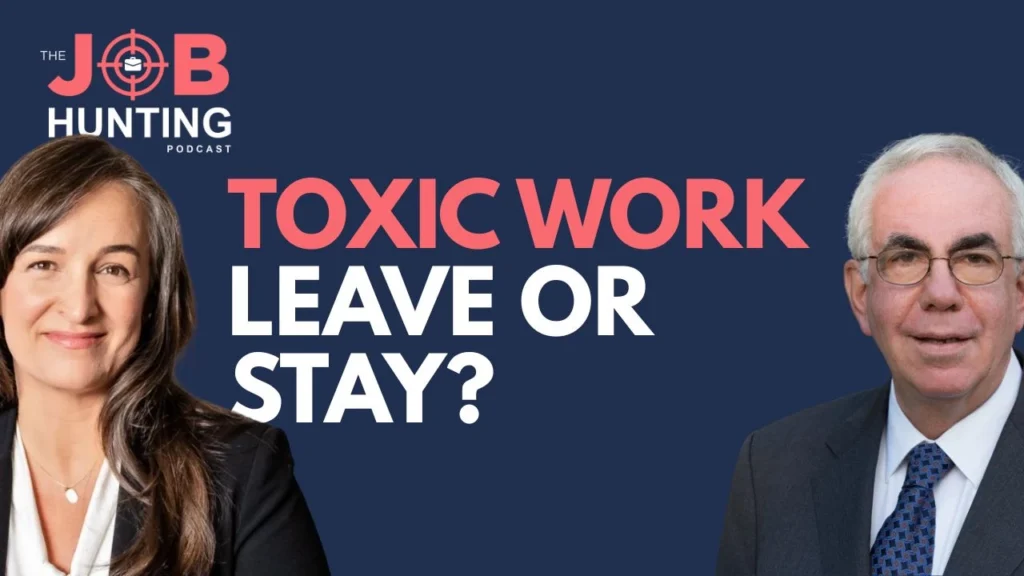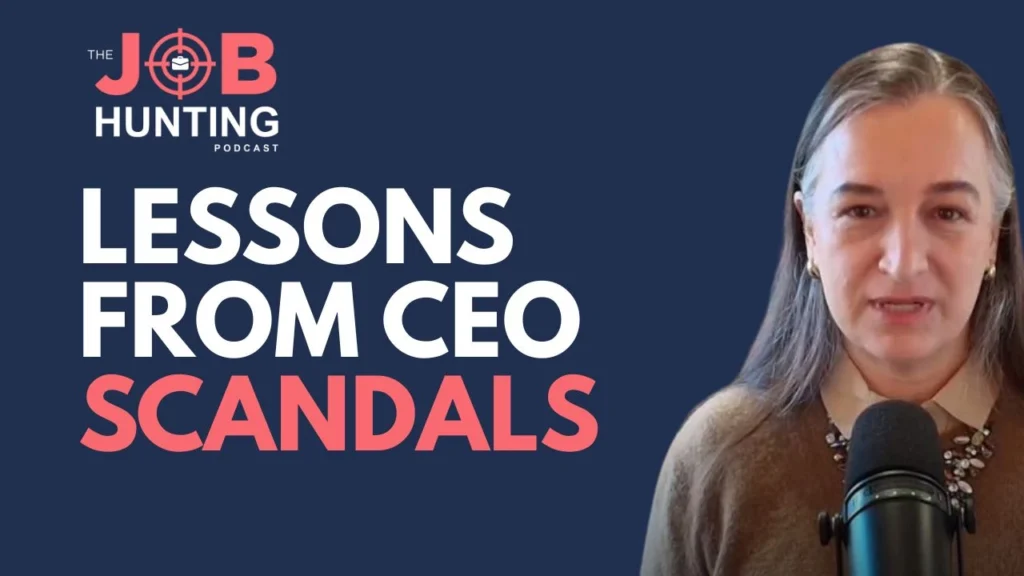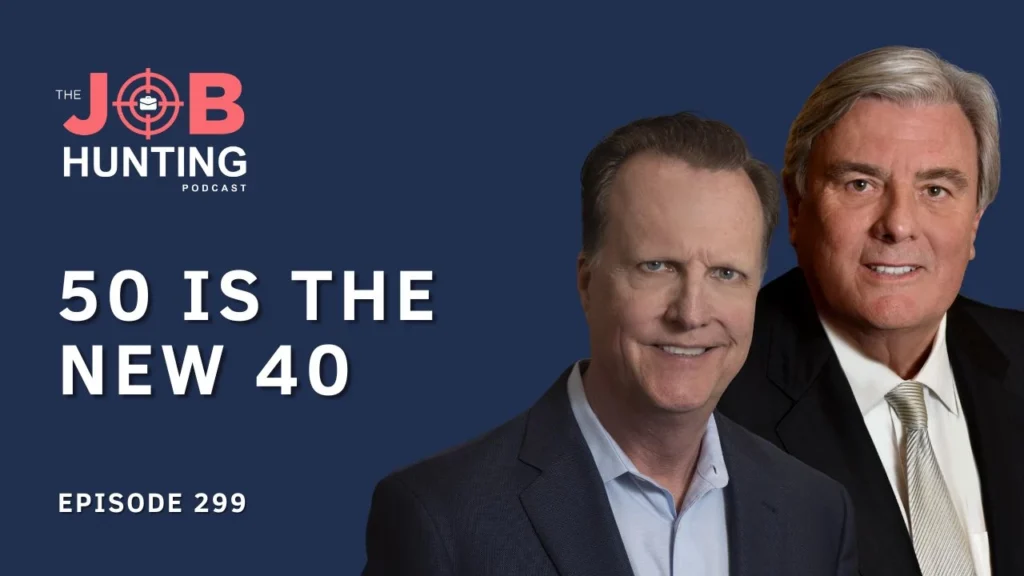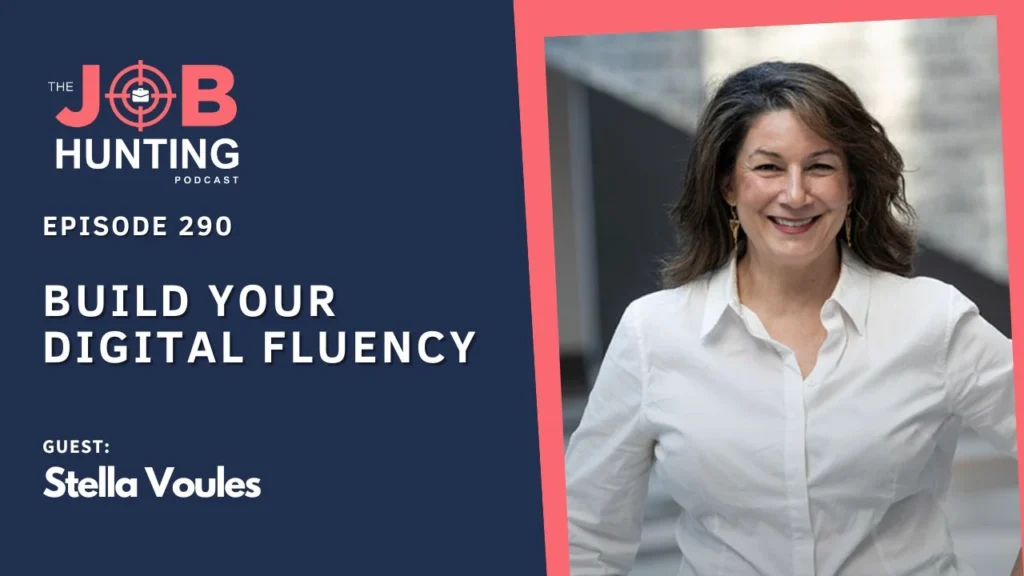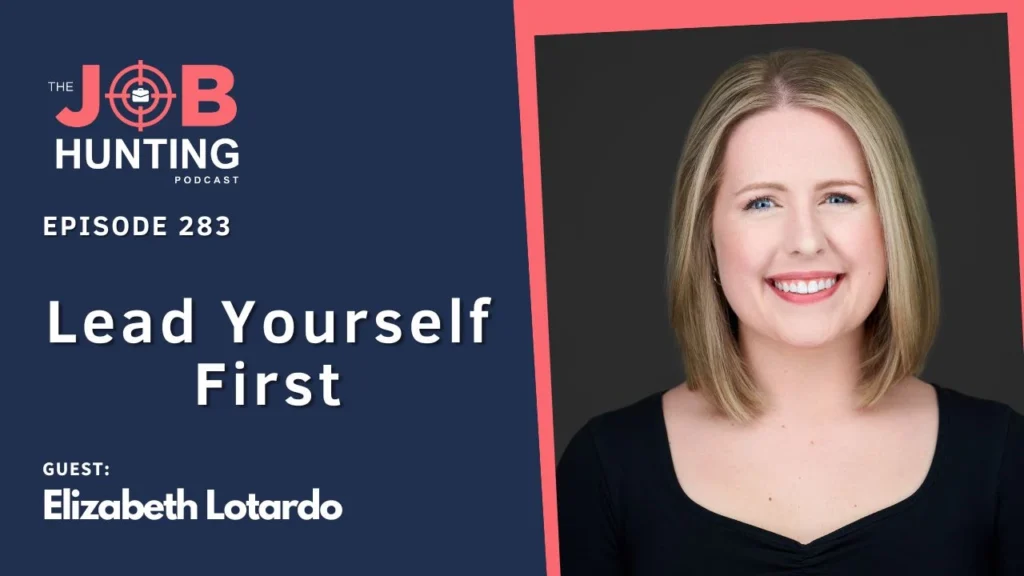Treat Culture Like Strategy
Episode 291 - How to Spot and Create a Great Workplace Culture
Culture has become a defining factor for career satisfaction and success. For job seekers in particular, the search is no longer about compensation or title. It’s about finding an environment where you can thrive, contribute meaningfully, and align with the company’s mission and values. Although this was always a “good to have” in the past, it has become more and more important in recent year. It’s what HR professionals call a shift in the EVP, our employee value proposition.
In this episode, I had the pleasure of speaking with Zrinka Lovrencic, the most experienced person I know when it comes to reviewing, analyzing, and assessing workplace culture. As the Managing Director at WorkPlus and previously at the helm of the coveted accreditation Great Place to Work Australia, Zrinka has helped hundreds of organizations recognize and build high-performing workplace cultures. In our conversation, we explored what makes a truly great workplace, how job seekers can assess culture before accepting a job, and the future of work post-pandemic.
This blog post is a summary of our conversation.
Intentional Culture is the Key to Success
Great workplace cultures do not happen by accident. As Zrinka explains, what distinguishes high-performing organizations from the rest is a deliberate and structured people strategy. Just as companies have corporate and sales plans, the best ones also have people and culture plans.
Leaders in these organizations do not leave employee experience to chance. They:
- Clearly communicate how each individual’s role ties into the company’s broader mission.
- Establish systems for learning and development.
- Align job descriptions, rewards, and recognition programs with their values.
Three Core Relationships Define Workplace Culture
Zrinka identified three crucial relationships that shape an employee's experience:
- Employee-Organization Relationship: Do employees understand and align with the organization’s mission, goals, and values? Is communication from leadership strong and consistent?
- Employee-Work Relationship: Are employees trained, supported, and provided feedback regularly? Is their workload manageable and their contribution recognized?
- Employee-Team Relationship: Are team dynamics respectful and collaborative? Do individuals feel connected despite remote or hybrid arrangements?
The Post-Pandemic Shift to Hybrid Work
One of the most impactful shifts in recent years is the normalization of hybrid work. Zrinka notes that a two to three-day office presence per week has become the norm among top organizations. This flexible model allows:
- Collaboration and real-time problem solving in person.
- Individual, focused tasks to be handled at home.
- Greater work-life integration, especially in dual-income households.
Importantly, organizations that embrace flexibility also see better employee retention and engagement.
The Hidden Costs of Ignoring Culture
Many professionals leave high-paying jobs for roles with better culture. As Zrinka notes, "Your mental health has a price on it." Chronic stress, misalignment with values, and poor leadership can drain even the most talented employees. In contrast, when people feel supported and connected, they perform better and stay longer.
Zrinka shared a standout example from her time working with SAS Institute. During economic downturns, their founder ensured no one was let go. As a private company, they had the flexibility to prioritize people over profit. That loyalty paid off in retention and performance.
Actionable Strategies for Job Seekers
Every week, my newsletter subscribers receive exclusive content regarding the podcast episode and the job market. Click here to subscribe if you’re not yet subscribed. If you are, you will have received the newsletter with actionable strategies to help your job search.
Future Outlook
The landscape of work is still evolving. Based on Zrinka’s insights, here are some trends to watch:
- Hybrid is Here to Stay: With rising costs and the proven feasibility of remote work, flexibility will remain a top employee demand.
- Leadership Development Will Become Central: In hybrid environments, managers need stronger skills to engage, support, and develop dispersed teams. Leadership pipelines must prioritize coaching ability over technical prowess.
- Mental Health and Inclusion as Strategic Priorities: Companies are investing more in psychological safety, well-being programs, and inclusive practices. These elements are no longer "nice to have" – they are strategic imperatives.
- AI and Automation Will Refocus Human Effort: While still emerging, AI is starting to streamline low-skill, repetitive tasks. This allows skilled professionals to focus on complex, high-value work. Embracing these tools can improve culture by reducing burnout.
The important takeaway from this episode is to reinforce what you probably already know: Corporate culture isn’t about free snacks or casual Fridays. It’s about alignment, respect, purpose, and systems that support people to do their best work. You have the opportunity to choose workplaces where you can thrive, not just survive. As Zrinka Lovrencic explains, great cultures are built with intention. And as a job seeker, you have the agency to evaluate potential employers through that lens. By doing your research, asking the right questions, and knowing your values, you can avoid toxic environments and build a fulfilling next chapter in your career.
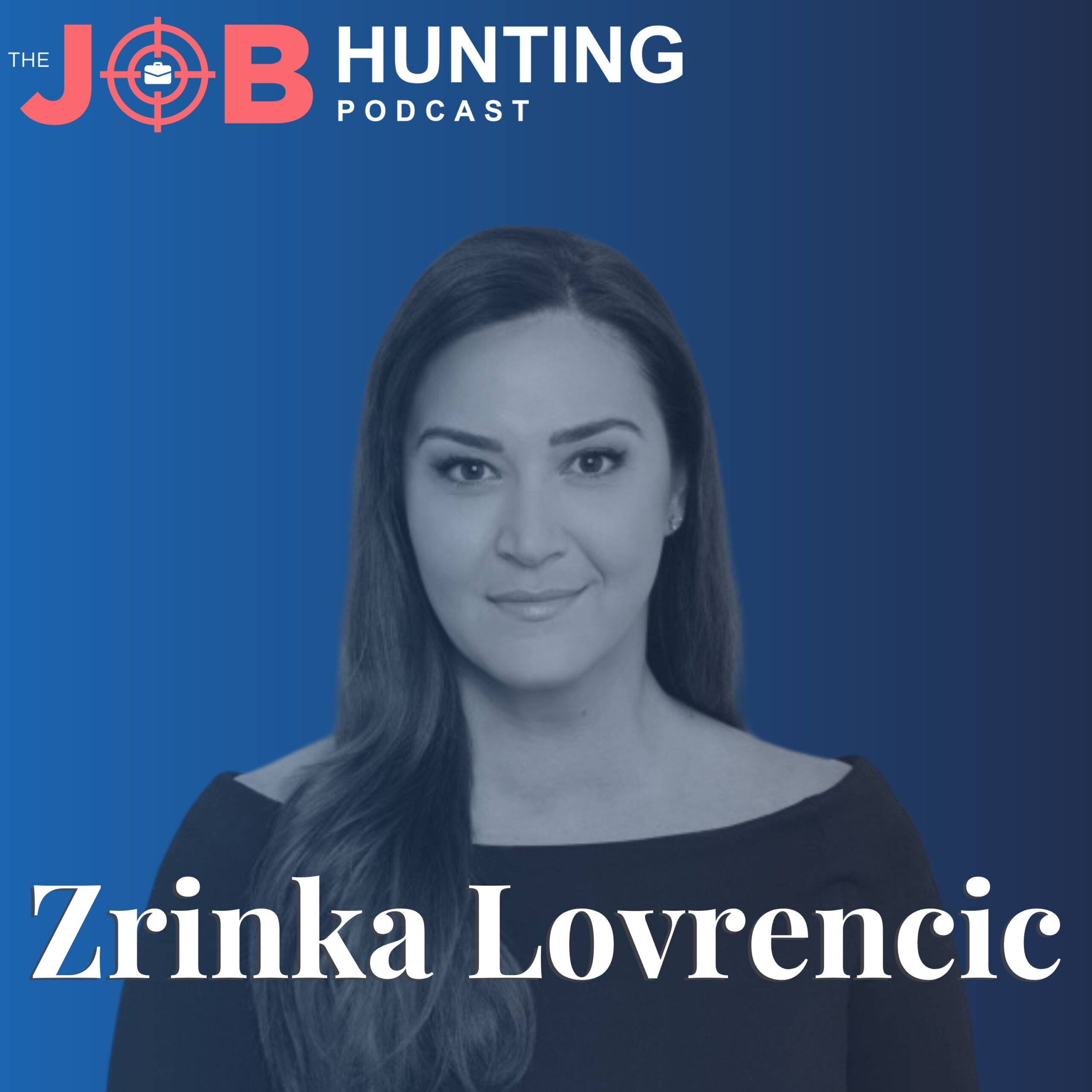
About Our Guest, Zrinka Lovrencic

About the Host, Renata Bernarde
Hello, I’m Renata Bernarde, the Host of The Job Hunting Podcast. I’m also an executive coach, job hunting expert, and career strategist. I teach professionals (corporate, non-profit, and public) the steps and frameworks to help them find great jobs, change, and advance their careers with confidence and less stress.
If you are an ambitious professional who is keen to develop a robust career plan, if you are looking to find your next job or promotion, or if you want to keep a finger on the pulse of the job market so that when you are ready, and an opportunity arises, you can hit the ground running, then this podcast is for you.
Resources Mentioned in This Episode
Timestamps to Guide Your Listening
-
00:00 Introduction and Background
-
02:09 Transforming Workplace Culture
-
05:02 Elements of a Great Workplace
-
07:55 Job Hunting and Workplace Culture
-
10:58 Navigating Disconnects in Values
-
13:57 The Impact of COVID-19 on Work Culture
-
16:52 Artificial Intelligence in the Workplace
-
19:12 Prioritizing Culture Over Compensation
-
22:15 Assessing Company Values
-
25:00 Identifying Red Flags in Organizations
-
28:13 Unique Examples of Great Workplaces
-
31:08 Future Trends in Workplace Culture
Transcript
Renata (00:55)
Now, I don’t know how much you can tell me about the sort of client work that you’re doing right now, but
Zrinka Lovrencic (01:01)
Ah,
Renata (01:02)
Where are you? And what are doing?
Zrinka Lovrencic (01:02)
yes. So, yes. So I can’t tell you where I am, but it’s an organization that’s going through quite a lot of change. It’s a 40 year old company and they’re about to go through a succession change. But because it is a, I would term it as a family business and small to mid size.
Renata (01:09)
Okay.
Zrinka Lovrencic (01:28)
it’s requiring a lot of transformation. So there’s a huge digital transformation program going on. And what WorkPlus is doing is the cultural transformation. So embedding a mission, vision, values, job descriptions, learning and development plans, reward and recognition programs, literally everything to do with HR. Because as is common with small businesses, these things just don’t exist in a formal manner, let alone an informal matter.
Renata (01:58)
Do you work with organizations that already have an HR function or are you a, and then you plug into their HR or they don’t have an HR, sort of very mature HR?
Zrinka Lovrencic (02:02)
Yeah.
bit of both. Sometimes we
work with companies that have extremely well developed HR. They’re just looking for an outside perspective, a fresh idea, insight into what other organizations are doing. know, have us look at their data and have a look at, well, is there something we’re just not thinking of right now? Right through to organizations that have never had a HR function and are looking to implement it.
Renata (02:35)
Yeah. Now I see you as an absolute expert when it comes to all of that, know, transforming workplaces, workplace culture. We first connected when you were at Best Places to Work and you were there for 18 years helping curate Best Places to Work in Australia. I used to read all of those lists every year when they came out and be so fascinated by the
Zrinka Lovrencic (02:49)
Mm-hmm.
Renata (03:04)
descriptions of why they were on this and I find it really fascinating. What led you to be in that place? What led you to transforming workplace cultures and being so interested in it?
Zrinka Lovrencic (03:17)
Yeah, you know, I think like a lot of careers, when you look backwards, I kind of ended up here by accident. My university studies and my first job were in accounting and finance. And, you know, I went into accounting and finance because I was good at numbers. ⁓ And what I really liked about that work is that it was very systematic. There was data to analyze. Everything had to kind of
fit in place, things had to balance out. And then sort of, you know, one role into another, I ended up working in a learning and development capacity. And then an opportunity came to join Great Place to Work when it opened in Australia. And I kind of feel like it married both the element that I was really interested in, which is how do people work and how do they add value to an organization married with the financial background of it.
And when you think about it, analyzing employee engagement data and analyzing cultural elements and so on, it all falls back to looking at spreadsheets, seeing where the breakage in pattern is, where the gaps are. And so that’s how I ended up at a great place to work and ⁓ ended up there for quite some time because I found it very interesting not only to learn about different organizations, but to be able to measure
organizations against each other and why was it that some were performing so well and had really long tenure of employees and then how did that differ in organizations that didn’t perform well, had really high rates of ⁓ employee turnover and so on.
Renata (05:02)
Okay, let’s dive deeper into that. What are the fundamental elements that would distinguish a truly great place to work from a good one? Let’s look from good to great. So tell me what would that look like?
Zrinka Lovrencic (05:15)
Yes.
I would say one of the things that really distinguishes the best organizations and the great organizations and even the good ones is that there is an actual effort to be so. Great workplaces don’t happen by accident. And what I mean by that is a lot of times I hear from leaders, I thought people would know this. I assumed they interpreted it the same way as me.
I think people will just go find the information by themselves and so on. In great workplaces, there’s a structure in place. There is a people and culture plan, just like there is a sales plan, just like there’s a corporate strategy and so on. It’s a very intended and intentional process to go through to create a great workplace. You have to think about each individual as a very important factor.
to the contributing success of your organization, you need to have very clear outlines of how their role impacts the overall strategy of the organization. So I would say that that’s probably the biggest difference is that there is an intention and a plan to create a great workplace. And it has to stem from the senior leadership team having an understanding that people are the difference in your organization.
And sure, with the digital transformations happening and so on, technology is playing a bigger role in organizations, especially from a serviceability and operational excellence point of view. But people are still what’s going to be making your business different. And so there are definitely some elements that form a basis of what is it that creates a great workplace. And you can kind of boil it down to three key relationships that an employee has.
One is the relationship employees have with the company itself. So in terms of do they align to the organization’s values? Do they want to deliver on the organization’s goals and promise and mission statement and so on? Do they feel that they have enough communication from senior leadership? And are they able to plug in that information back in order to achieve that goal? ⁓
Secondly is the relationship people have with the work itself. So are they being supported? Are they being trained? Do they get enough feedback? Do they get enough support when things go astray for them and so on? And lastly, and probably the element that’s been tested most due to COVID.
is the connection with other people in the organization. How are we working together as a team to reach the common goals? Do we respect each other’s differences and similarities and so on? So that’s kind of the three areas you have to look at. How are you going to deliver those three relationships to make sure you’re getting the most out of each individual?
Renata (08:17)
That’s wonderful to, you know, sort of have those three points to focus on, especially because this is the job hunting podcast. during the recruitment and selection process, there could be red flags, green flags there to help ⁓ the candidates identify the culture of the place through the recruitment process. But one thing that I’ve noticed as well, ⁓ when from time to time I do
free webinars online and one of the first questions that I ask is, know, what are you looking for? And nine times out of 10 people are looking for a better culture, right? They really are. And I sort of put the question back to them to say, if you’re looking for a better culture, you have to be the better culture.
Zrinka Lovrencic (09:12)
Hmm.
Renata (09:13)
Right? So that they won’t just absorb you and then all of a sudden you will be in a better culture. You have to bring the better culture with you to add value to that existing great culture.
Zrinka Lovrencic (09:26)
Yes. So I would say every organization has a culture. You know, you may like it or not like it. The senior leadership may like it or not like it, but a culture already exists. And it’s, think, you know, as you’re going through the job hunting period, it takes a lot of planning to get there and thinking about what is it that I enjoy? What is it that I don’t enjoy? What is the environment I thrive in?
Renata (09:31)
Yeah.
Mm.
Zrinka Lovrencic (09:56)
What are elements that are not conducive to me producing my best effort? What kind of behavior am I okay with? What kind of behavior do I want to display? What kind of behavior do I want to receive? So it does take a little bit of planning as well. And thinking about yourself first and what it is that you are going to thrive in, but also what is it that you will bring to an organization as well.
Renata (10:12)
Yeah.
That’s such a good point. thinking about the organization and the culture that it displays, that it ⁓ sort of absorbs, what do you do when there is a disconnect between the values and the practice? Do you see that often in the work that you do? And I know that this is probably one of the reasons
a lot of people fall out of love with their jobs is because of that disconnect.
Zrinka Lovrencic (10:58)
Absolutely, absolutely. And you know, the job hunting process, it’s a sales pitch on both ends. As an individual, you think you are the best person for the role, you come prepared with all your strengths and your positive points, and an organization does the same. ⁓ Almost every organization I’ve ever worked with has said to me, have a really great culture here.
And it’s because they believe they have a great culture. Now, whether they’ve measured that, had that assessed, had it verified by somebody else, that’s separate issue. And so I feel like it’s really important, especially in the beginning of your tenure with a new employer, is for both the organization, so your team leader, your manager, and for you to have regular check-ins about expectations and reality and what is working, what isn’t working, what needs to be adjusted.
Again, it’s one of those defining differences of great workplaces is that they actually put an effort in to ensuring that the person they have hired stays and works out because it’s a big investment for an organization ⁓ to find a new employee. But same for the individual as well. You know, it’s really important that that first impression that an organization gave you is realized. And if it’s not realized, whether, you know, it’s still something that
that speaks to you and attracts you and makes you want to get out of bed and go to work? Or what are the elements that need to be adjusted and changed and improved ⁓ for that experience for you?
Renata (12:25)
Yeah.
Yes. And I feel like a lot of that has changed since the pandemic. ⁓ I’m going to repeat that and I’m going to let Jocky out.
Zrinka Lovrencic (12:45)
Gotta let
the dog have a little run around.
Renata (12:59)
That’s wonderful, Zorinka. I really like how you explain this. And I’m wondering here if a lot has changed since the pandemic. I’m thinking about the employees and the candidates’ expectations with flexible work arrangements, with working from home arrangements. I was listening to the news this morning and they believe that one of the reasons why the Liberal Party lost the election is their ⁓
early take on working from home, which did not, was not well received by the electorate, I suppose, because people voted with their feet, even though they backtracked. So if you’re listening from overseas, there were statements made about the Liberal Party not being very keen on working from home arrangements for government employees and then
because of the backlash, they backtracked, but I think it was too late. They lost the election, not just because of that, but it was considered now one of the big reasons why. And I’m not surprised because as a coach, I see that happening all the time. People that are offered roles and say, no, if I have to go five times a week to the office on the other side of town, I’d rather apply for other jobs and wait and see what happens.
In that context of hybrid work environment, how have the criteria for a great workplace changed?
Zrinka Lovrencic (14:34)
So I think if we take it back to prior to COVID and think about what were some of the key ⁓ areas organizations were focusing on, one of them was female participation in the workforce. And part of that was trying to include male employees in flexibility in understanding roles and responsibilities, both at home and in the workplace.
creating an environment in an organization where it was okay for males to ask for time off and for flexibility and, you know, attend their children’s appointments and their carers leave responsibilities and so on. And so I’m not surprised that there has been such a backlash because COVID kind of spurred us into that direction. You know, everyone was basically working from home and yes, we were all.
running to stand still really and to keep our head above water and to deal with all the economic challenges of COVID, it’s a little bit hard now to roll it all back. One, because most of our households are two income households. They’re not single income households. And for that reason, we need flexibility and an understanding.
And maybe being forced into COVID and lockdowns and working from home helped us understand that we actually can be flexible. You know, it’s not a balance, it’s a blend of your 24 hours because a lot of us deal with international clients, international team members. And so we’re flexible about doing calls early in the morning, late in the evening. I think people are seeking that same flexibility when it comes to the workday, even now.
The second factor is that the cost of attending work has increased drastically from 2019 to now. Not only is public transport more expensive, parking is more expensive, petrol is more expensive, childcare is more expensive, after school care is more expensive. So people are looking at it from an economic point of view as well. Is it worth me traveling to work? Is it worth me working?
you know, from an office rather than whatever solution they have at home. And this is why it’s so important to have those conversations with team members. Now, you know, I can see with the organizations that we’re working with and that we continue to do research with, two to three days in the office seems to be the norm. And it seems to be a happy medium for employees as well to have an understanding that, yes, we are still a team that’s working
towards a common goal and common outcomes at the organization. for that, there are times we need to work together, discuss ideas together, help each other grow and learn, ⁓ and so on. But there are definitely tasks you can do from home where you might not have access to your team leader as instantly as you do in the office or a colleague and so on.
Renata (17:45)
Yeah, no, that seems to be about right. The other topic that I see a lot is artificial intelligence and how engaging with artificial intelligence in the workplace is potentially going to affect culture and many other things, productivity, employability. Are you noticing that already? Is that a topic of conversation that you’re having with your clients?
Zrinka Lovrencic (18:13)
AI is a topic of conversation, but it’s a little bit of an unknown element still, you know, it’s still kind of seen as a gimmick and maybe something that’s helping us refine processes, get a start and so on. I think this digital transformation journey we have been on for quite some time now is refining those repetitive tasks, tasks where human error is still a high factor. And I welcome that we’re still
in a country where unemployment is low, we still have a lot of open roles. if there are lower skill areas we can automate and replace with machinery for lack of a better term, you know, to make sure that we’re focusing our limited labor to work on complex issues and ideas and so on. I can see it still being a benefit for
our environment and our economy.
Renata (19:14)
Yeah, yeah, absolutely. Okay, let’s go back to job seekers and think about how we can help them ⁓ through the recruitment process to identify and work out what they want for their careers and their future paths. One of the things that I wanted to ask you, and I want to start there and then ask you a few more questions ⁓ in relation to this is, do you think candidates should prioritize
Zrinka Lovrencic (19:19)
Mm-hmm.
Renata (19:44)
culture and values and purpose over factors like compensation or title. I ask this because I see a trend now that’s kind of leading to this. People that are stepping out of jobs that they earn more and looking for opportunities in different sectors or industry, not so much moving a level down from the work that they do, but just moving from, let’s say, tech to…
another industry or another sector, maybe a nonprofit, what they will use similar skills, but they’re just craving for better work culture and they want to try a different industry or a different sector. What do you have to say about that and about those different priorities?
Zrinka Lovrencic (20:23)
Hmm.
you. I definitely agree with that. Your mental health has a price on it as well. And you have to look after yourself and your well-being. And if that means that, you know, prioritizing a better culture where you’re going to be excited to go to work, you’re going to do your better work when you’re excited about going to work, where you go home feeling like
you achieved something, you contributed to something rather than going home feeling stressed about not achieving, feeling stressed about how you’re going to be spoken to the next day. You know, it’s worth making that cut because you will actually flourish in an environment where you are more comfortable and you feel more secure and more safe and it will compensate for the money later on.
Renata (21:22)
Okay.
Zrinka Lovrencic (21:23)
I think a lot of organisations are starting to realise as well that a lot of the mental health issues we have do stem from the work environment and the way that we treat employees and work and so on. And so things are definitely changing. But I think, you know, at the end of the day, life’s too short to be unhappy for a higher paycheck.
Renata (21:46)
Yeah. Okay. In that case, they will go out and look for opportunities. One of the things that I am always concerned about because of the types of clients that I see is that they might jump into another world too quickly without really doing their due diligence about culture, about values, and really understanding what their career drivers are, what their values are.
From your perspective, how can they best assess the company’s values before saying yes to a new role?
Zrinka Lovrencic (22:22)
Yeah, yeah, you know, just do some Google stalking on the organization for a start. Have a look at their about us page, their career page. Usually organizations will list their mission statement and you know, think about, well, is this something that I would like to work towards as well? Do I see my skills being used best for this? Have a look at the organization’s values and have a look how do they resonate with you? Is this the…
Renata (22:27)
Yeah.
Zrinka Lovrencic (22:51)
⁓ rules, the family rules you would like to work within and towards as well. ⁓ And, you know, see if you feel like you will fit into an organisation that way. And that’s prior to going to an interview. In the interview, I would ask questions around values. How are they implemented? How are they lived? How are they recognised and rewarded? And also come prepared with a list of
questions around things that matter to you. So if flexibility matters to you, definitely ask about how the company views, well, what is the definition of flexibility to the organization in the first place? How it implements flexibility. If opportunities to ⁓ travel within an organization and go on secondments elsewhere is important to you, ask those questions. know, same with family leave policies.
Renata (23:32)
Mm.
Zrinka Lovrencic (23:46)
ask how many hours of learning and development an average employee has in the organization if growth is important to you. So feel free to ask questions and actually organizations really appreciate that as well. It shows that you are serious about staying at an organization. It shows that you’re planning for the long-term future with an organization and you know it helps them feel more secure in investing in you as well. So
Renata (24:00)
Yeah.
Zrinka Lovrencic (24:15)
It all starts with understanding what it is that you are looking for, understanding what it is that you want to align with, and then finding whatever information you can, but also asking the questions for clarification and reinforcement in the interview as well.
Renata (24:31)
Yes, absolutely. ⁓ think that that is, I always tell people ask questions that you cannot find the answers to them online. I was just working with a client, he said, I just thought of this question. I’m like, well, you Google that first because I just found it. And then, you know, make sure that your questions are more sophisticated than what you can find online. that that early research is so important.
Zrinka Lovrencic (24:43)
New York.
Renata (25:00)
In terms of red flags, either during the recruitment process or when you start or are in an organization, I feel sometimes that even with clients that have been in organizations for so long and then they come to me because they’re extremely unhappy and they don’t see that they have normalized bad behavior and they can’t even see red flags anymore.
you know, it’s just normal to them. Isn’t it like that everywhere? I’m like, no, just go somewhere else. So you have any red flags that we can maybe identify to let people know if this is happening in your workplace, then, you know, keep an eye on this is not normal. It’s not right.
Zrinka Lovrencic (25:35)
Yeah.
Yeah,
absolutely. I think if you are feeling like your team leader isn’t your coach and isn’t there to support you and to bring out the best in you, that’s a red flag. You know, shouldn’t be spoken to in a poor manner. You should be respected in the workplace. I think sometimes because of prolonged bad behavior, we tend to forget that it is bad behavior, but it is.
If you’re not excited at the end of the day by the things you have achieved in the workplace, that’s a red flag. You should be excited about what you’re working on, where it’s going, what you’re achieving and so on. ⁓ What are some other red flags? ⁓ There’s so many. There’s so many, you know, I think if you’re not having an
At least an informal review with your team leader on a monthly basis. That’s a red flag. You can’t do a review once a year. ⁓ It’s too late. It’s too late. You should be working on incremental improvements in the workplace. ⁓
think about this. Yeah, you know, in the interview process, I think this one comes up a lot. But when organizations say we’re a family here, you shouldn’t be joining a family in the workplace, you should be joining a community. Because communities work together, families don’t necessarily work together. I sometimes think that’s it. Families can be dysfunctional and families are not always healthy.
Renata (26:56)
That’s good. That’s okay.
It can be very dysfunctional.
Zrinka Lovrencic (27:23)
But I think that you should be looking to join a community because you’re looking at ⁓ bringing your skills and enhancing other people’s skills along the way and using your skills to achieve a common good. The other thing is that a lot of the time through the ⁓ recruitment process, we’re always looking for people with different skills.
different way of thinking, you know, it’s one of the reasons why we look for diversity in the workplace. But then you join an organization and they say, no, we think this way. We do things this way. That kind of defeats the purpose of you coming with unique skills and unique processes and a unique way of of looking at things. So it’s important to look out for that and call that out.
Renata (28:13)
Okay, awesome.
I like that. Have you, mean, you know, all the work that you have done and you have a biased sample because with the work that you have done at best places to work and for the 18 years that you were there, these were organizations that were ambitious for their culture, ambitious for their people. And then I find that, you know, as you now work at
work plus, know, with this consultancy looking at transforming and developing workplaces even further, they come to you, they already want something, they are very ambitious, right? So I’m assuming you’ve seen some very good examples. I’m wondering here if something has really stood out to you over the course of your career and maybe surprised you by being unique or
completely out of the box and so amazing. Do you have a couple of examples for us?
Zrinka Lovrencic (29:14)
Yeah, yeah,
you know, there’s examples that from early on in my time that will stick with me forever. One of them is a company called SAS Institute. ⁓ I haven’t worked with them in over a decade, so I’m not sure if their founder is still around, but his name was Jim Goodnight. And he always spoke about, you know, during the good times, putting money away in a reservoir for the bad times. And so we actually went.
through two poor economic cycles while working with them. And they were in a position to ensure that ⁓ nobody was going to be let go. Yes, they were going to be hiring freezers if people left and so on. But we were talking about this once in a group setting and there was somebody else in the circle who said something like, I asked about the…
the numbers of it, you know, the percentage of profit that’s being used in this bubble. And he turned around and he said, do you realize it’s a private company? Like, I have no shareholders to please. I can I can do things that I want to do. And that really, you know, that that was one of those moments that stood out for me that like, yes, sometimes private organizations, because there’s no shareholders can be a lot more generous, but not always right. They can also act in
in an opposite manner as well, or if there’s no governance in place, it doesn’t hold you accountable. I think that organizations that really get it, really get it. They understand that creating an environment that’s open, in welcoming, inviting, grateful for everyone’s talents that they bring to the workplace every single day are definitely more profitable and more successful as well. You don’t
focus on being a great workplace just when the times are good. You focus on it all the time. You especially have to focus on it when times are bad because that’s when you want your best people to stay and for everyone to continue putting in their best effort to help the company trade out of the bad time. But if you haven’t been a good employer, then why would people be, ⁓ I can’t think of the word. ⁓
Renata (31:36)
you
Zrinka Lovrencic (31:37)
If you haven’t been a good employer, why would people…
my God, I’m having a brain freeze. Yeah, it’ll come true. If you haven’t been a good employer, then why would people be loyal to your organization and be accountable to get them out of the poor times?
Renata (31:54)
who are in the
Yeah, no, absolutely. And, Serenka, when you look ahead, do you see or foresee any new trends? mean, things are changing so rapidly, it’s hard to keep up. And I’m wondering here if you see a growing area in terms of employee experience or workplace culture that it’s just starting now that maybe people
people can hop on it and sort of be ahead of the curve there.
Zrinka Lovrencic (32:32)
Yeah,
I think a lot of organizations are going back to basics around looking at what is absolutely important to the organization and what isn’t. And that’s because we haven’t had an amazing economic time for the last couple of years, right? So, but it’s bringing up really important elements of understanding who your team is, understanding what makes them thrive, understanding what is important to the organization and what is not.
And something that we touched on earlier but didn’t get quite into is, you know, how has COVID changed the workplace? Because of the hybrid environment and hybrid working, it’s put a lot more responsibility and onus on team leaders and managers to have more of a touch point with people, especially the ones who aren’t in the office 24 hours a day, because out of sight, out of mind, it’s just unfortunately a human condition.
So it’s putting a lot more onus on developing your pipeline of leaders, of managers, of supervisors and so on, and ensuring that they have the right skills to lead people. You know, that they are people who genuinely have an interest in coaching others and getting the best out of them rather than people who are good at the technical aspect of their role. So they’re being promoted into a management role. So I would say that they would be the big trends that are.
happening. I think despite what has been in the media lately, diversity and inclusion is still ⁓ thriving in workplaces, especially in Australia. And I think that’s something that we should be proud of because we are such a diverse country and we need to celebrate that in the workplaces as well. And I think that there is a continuing focus on mental health and mental safety in the workplace as well because we
we know that that’s a huge cost to our society and organizations are looking after that as well.
Renata (34:31)
that’s so good to know, such a relief. It’s been quite a depressing start of the year for us when it comes to diversity and inclusion. And I was really wondering about that. So it’s good to know that an expert like you think that we can still focus on this and grow that area. And hopefully, you know, we will see that continuing to grow and thrive in the future. So thank you so much.
Zrinka Lovrencic (34:34)
Yeah.
Renata (34:56)
Thank you for being on the podcast. know we had trouble booking it, but I’m glad we did it in the end.
Zrinka Lovrencic (35:02)
no, I’m so glad. Thank you so much for the opportunity as well.
Renata (35:05)
No problem. If people want to find you and work with you, I will put the link below so that I can find you easily on LinkedIn, on your website. And yeah, you can come back any time to talk more to us about your great experiences.
Zrinka Lovrencic (35:12)
Yes, please.
excellent. Thank you. Thank you so much and have a wonderful time away.
Renata (35:27)
working on YouTube, say bye Jocky! The dog’s here as well.


